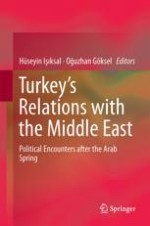2018 | OriginalPaper | Buchkapitel
8. Assessing the Regional Influence and Relations of Turkey and Saudi Arabia After the Arab Spring
verfasst von : Konstantinos Zarras
Erschienen in: Turkey’s Relations with the Middle East
Aktivieren Sie unsere intelligente Suche, um passende Fachinhalte oder Patente zu finden.
Wählen Sie Textabschnitte aus um mit Künstlicher Intelligenz passenden Patente zu finden. powered by
Markieren Sie Textabschnitte, um KI-gestützt weitere passende Inhalte zu finden. powered by
